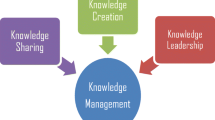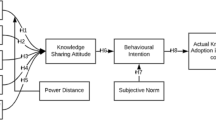Abstract
Knowledge is regarded as a strategic resource in organizations; thus the leverage of knowledge is a key managerial issue. Knowledge creation, sharing and dissemination are the main activities in knowledge management. This study examines the influence that social and technological factors, such as learning culture and IT use, could have on knowledge sharing among students of the King Fahd University of Petroleum and Minerals in Saudi Arabia. A cross-sectional survey was used as a research method for data collection and 302 valid responses were collected from all the three categories of students that include graduates, undergraduates and preparatory students. The results show that there is a significant positive relationship between both student learning culture and IT use and students’ knowledge sharing. The limitations of this study and practical implications, along with directions for further research are discussed.

Similar content being viewed by others
References
Alavi M, Kayworth TR and Leidner DE (2006) An empirical examination of the influence of organizational culture on knowledge management practices. Journal of Management Information System 22 (3), 191–224.
Allen M and Yen W (1979) Introduction to Measurement Theory. Wadsworth Inc, Belmont, CA.
Alwi NH, Abdul-Hamid H and Abu-Bakar A (2009) Factors contributing knowledge sharing in higher learning institution. USIM Lecturer's Conference Papers (April Issue), Malaysia [WWW document] http://ddms.usim.edu.my/handle/123456789/495 (accessed 5 June 2010).
Ardichvili A, Maurer M and Li W (2006) Cultural influences on knowledge sharing through online communities of practice. Journal of Knowledge Management 10 (1), 94–107.
Argote L (1999) Organizational Learning: Creating, Retaining and Transferring Knowledge. Kluwer Academic Publishers, Boston, MA.
Argote L, McEvily B and Reagan R (2003) Introduction to the special issue on managing knowledge in organization: creating, retaining and transferring knowledge. Management Sciences 49 (4), 5–8.
Argote L and Paul I (2000) Knowledge transfer: a basis for competitive advantage in firms. Organizational Behavior and Human Decision Processes 82 (1), 150–169.
Barrick MR, Parks L and Mount MK (2001) Self monitoring as a moderator of the relationship between personality traits and performance. Personnel Psychology 58 (3), 745–767.
Bates AW (1993) Theory and practice in the use of technology in distance education. In Theoretical Principles of Distance Education (KEEGAN D, Ed), pp 213–233, Routledge, London.
Benbya H and Belbaly N (2005) Mechanisms for knowledge management systems effectiveness: an exploratory analysis. Knowledge and Process Management 12 (3), 203–216.
Bock GW and Kim YG (2002) Breaking the myths of rewards: an exploratory study of attitudes about knowledge sharing. Information Resources Management Journal 15 (2), 14–21.
Bock GW, Zmud RW and Kim Y (2005) Behavioral intention formation in knowledge sharing: examining the roles of extrinsic motivators, social-psychological forces, and organizational climate. MIS Quarterly 29 (1), 87–111.
Brown J and Duguid P (2000) The Social Life of Information. Harvard Business School Press, Cambridge, MA.
Burgess D (2005) What motivates employees to transfer knowledge outside their work unit? Journal of Business Communication 42 (4), 324–348.
Calantone RJ, Cavusgil ST and Zhao Y (2002) Learning orientation, firm innovation capability, and firm performance. Industrial Marketing Management 31 (6), 515–524.
Carleton J (1997) Cultural due diligence. Training 3 (11), 67–75.
Carmines EG and Zeller RA (1980) Reliability and Validity. Sage Publications, London.
Cohen WM and Levinthal DA (1990) Absorptive capacity: a new perspective on learning innovation. Administrative Science Quarterly 35 (1), 128–152.
Connelly CE and Kelloway EK (2003) Predictors of employees’ perceptions of knowledge sharing culture. Leadership & Organization Development Journal 24 (5), 294–301.
Conner ML and Clawson J (2004) Creating a Learning Culture: Strategy, Practice, and Technology. Cambridge University Press, Cambridge.
Cordoba GIT (2004) Learning culture and information technology learning mechanisms in disaster management organizations in Central America. PhD Thesis, Tulane University, New Orleans, USA.
Cranfield DJ and Taylor J (2008) Knowledge management and higher education: a UK case study. The Electronic Journal of Knowledge Management 6 (2), 85–100.
Cummings JN (2004) Work groups, structural diversity and knowledge sharing in a global organization. Management Science 50 (3), 352–364.
Daniel JS (1998) Technology Strategies for Higher Education, Mega-universities and Knowledge Media. Kogan Page, London.
Darroch J (2005) Knowledge management, innovation and firm performance. Journal of Knowledge Management 9 (3), 101–115.
Davenport T and Prusak L (1998) Working Knowledge: How Organizations Manage What They Know. Harvard Business School Press, Boston, MA.
Davenport TH (1997) Information Ecology. Oxford University Press, New York.
Faraj S and Wasko M (2002) The web of knowledge: an investigation of self-organizing communities of practice on the net. Working paper [WWW document] http://opensource.mit.edu/papers/Farajwasko.pdf (accessed 3 October 2009).
Graham C and Nafukho F (2007) Culture, organizational learning and selected employee background variables in small-size business enterprises. Journal of European Industrial Training 31 (2), 127–144.
Gurteen D (1999) Creating a knowledge sharing culture. Knowledge Management Magazine 2 (5), 1–4.
Haldin-Herrgard T (2000) Difficulties in diffusion of tacit knowledge in organization. Journal of Intellectual Capital 1 (4), 357–365.
Hislop D (2002) Mission impossible? Communicating and sharing knowledge via information technology. Journal of Information Technology 17 (33), 165–177.
Hlupic V, Pouloudi A and Rzevski G (2002) Towards an integrated approach to knowledge management: ‘hard,’ ‘soft’ and ‘abstract’ issues. Knowledge and Process Management 9 (2), 90–102.
Hogel M, Parboteeah KP and Munson CL (2003) Team-level antecedents of individuals’ knowledge networks. Decision Sciences 34 (4), 741–770.
Huysman M and Wulf V (2006) IT to support knowledge sharing in communities, towards a social capital analysis. Journal of Information Technology 21 (1), 40–51.
Ipe M (2003) Knowledge sharing in organizations: a conceptual framework. Human Resource Development Review 2 (4), 337–359.
Ismail MA and Chua LY (2005) Implication of knowledge management (KM) in higher learning institution. In Proceedings of the International Conference on Knowledge Management, PWTC, p 5, Kuala Lumpur, Malaysia.
John S (2001) Research and the knowledge age. Tertiary Education and Management 7 (3), 227–230.
Johnston R and Hawke G (2002) Case Studies of Organizations with Established Learning Cultures. National Centre for Vocational Education Research, Adelaide, Australia.
Joo B (2007) The impact of contextual and personal characteristics on employee creativity in Korean firms. PhD Thesis, University of Minnesota, USA.
Kang Y, Kim S and Chang G (2008) The impact of knowledge sharing on work performance: an empirical analysis of the public employees’ perceptions in South Korea. International Journal of Public Administration 31 (4), 1548–1568.
Kankanhalli A, Tan BC and Wei K (2005) Contributing knowledge to electronic knowledge repositories: an empirical investigation. MIS Quarterly 29 (1), 113–143.
Kerlinger F (1973) Foundations of Behavioral Research. Holt, Rinehart and Winston, Toronto.
Kim BO and Lee SM (1996) Logistics information's role within an IT systems’ architecture in a world-class organization. Logistics Information Management 9 (3), 19–26.
Kim J and King J (2004) Managing knowledge work: specialization and collaboration of engineering problem solving. Journal of Knowledge Management 8 (2), 53–63.
Kim S and Lee H (2006) The impact of organizational context and information technology on employee knowledge-sharing capabilities. Public Administration Review 66 (3), 370–385.
Kogut B and Udo Z (1992) Knowledge of the firm, combinative capabilities, and the replication of technology. Organization Science 3 (3), 383–397.
Kumar N (2005) Assessing the learning culture and performance of educational institutions. Performance Improvement 44 (9), 27–34.
Liao SH, Chang JC, Cheng SC and Kuo CM (2004) Employee relationship and knowledge sharing: a case study of a Taiwanese finance and securities firm. Knowledge Management Research and Practice 2 (1), 24–34.
Lin HF (2006) Impact of organizational support on organizational intention to facilitate knowledge sharing. Knowledge Management Research and Practice 4 (1), 26–35.
Lin HF (2007) Knowledge sharing and firm innovation capability: an empirical study. International Journal of Manpower 28 (3/4), 315–332.
Lin HF and Lee GG (2004) Perceptions of senior managers toward knowledge sharing behavior. Management Decision 42 (1), 108–125.
Lu L, Leung K and Koch PT (2006) Managerial knowledge sharing: the role of individual, interpersonal and organizational factors. Management and Organization Review 2 (1), 15–41.
Lukas B, Hult G and Ferrell O (1996) A theoretic perspective of the antecedents and consequences of organizational learning in marketing channels. Journal of Business Research 36 (3), 233–244.
Maccoby M (2003) The seventh rule: create a learning culture. Research Technology Management 46 (3), 59–61.
Mohamed M, Stankosky M and Murray A (2006) Knowledge management and information technology: can they work in perfect harmony? Journal of Knowledge Management 10 (3), 103–116.
Nickerson J and Zenger T (2004) A knowledge-based theory of the firm: the problem solving perspective. Organization Science 15 (6), 617–632.
Nonaka I (1994) A dynamic theory of organizational knowledge creation. Organizational Science 5 (1), 14–37.
Nonaka IO and Takeuchi H (1995) The Knowledge-creating Company: How Japanese Companies Create the Dynamics of Innovation. Oxford University Press, New York, NY.
Nunnally JC (1978) Psychometric Theory. McGraw-Hill, New York.
Nunnally JC and Bernstein IH (1994) Psychometric Theory. McGraw-Hill, New York, NY.
Pai J (2006) An empirical study of the relationship between knowledge sharing and IS/IT strategic planning (ISSP). Management Decision 44 (1), 105–122.
Park H, Ribière V and Schulte W (2004) Critical attributes of organizational culture that promote knowledge management technology implementation success. Journal of Knowledge Management 8 (3), 106–117.
Riege A (2005) Three-dozen knowledge-sharing barriers managers must consider. Journal of Knowledge Management 9 (3), 18–35.
Roberts J (2000) From know-how to show-how? Questioning the role of information and communication technologies in knowledge transfer. Technology Analysis and Strategic Management 12 (4), 429–443.
Rowley J (2000) Is higher education ready for knowledge management? The International Journal of Educational Management 14 (7), 325–333.
Scarbrough H (2003) Knowledge management, HRM and innovation process. International Journal of Manpower 24 (5), 501–516.
Schwartz DG (2007) Integrating knowledge transfer and computer-mediated communication: categorizing barriers and possible. Knowledge Management Research & Practice 5 (4), 249–259.
Stewart TA (1997) Intellectual Capital: The New Wealth of Organization. Doubleday Currency, New York.
Szulanski G (1996) Exploring internal stickiness: impediments to the transfer of best practice within the firm. Strategic Management Journal 17 (Winter Special Issue), 27–43.
Uys P, Nleya P and Molelu GB (2004) Technological innovation and management strategies for higher education in Africa: harmonizing reality and idealism. Educational Media International 40 (1), 19–25.
Walsham G (2002) Knowledge management: the benefits and limitations of computer systems. European Management Journal 19 (6), 599–608.
Wasko M and Faraj S (2005) Why should i share? Examining social capital and knowledge contribution in electronic networks of practice? MIS Quarterly 29 (1), 1–23.
Yao TH, Kam TH and Chan SH (2007) Knowledge sharing in Asian public administration sector: the case of Hong Kong. Journal of Enterprise Information Management 20 (1), 51–69.
Author information
Authors and Affiliations
Corresponding author
Rights and permissions
About this article
Cite this article
Eid, M., Nuhu, N. Impact of learning culture and information technology use on knowledge sharing of Saudi students. Knowl Manage Res Pract 9, 48–57 (2011). https://doi.org/10.1057/kmrp.2010.25
Received:
Revised:
Accepted:
Published:
Issue Date:
DOI: https://doi.org/10.1057/kmrp.2010.25




